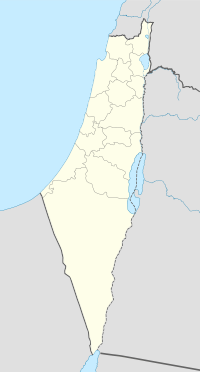Al-Faluja
| al-Faluja | |
|---|---|

Arab civilians and Israeli soldiers in al-Faluja after the Israel Defense Forces entered the village, 1949
|
|
| Arabic | الفالوجة |
| Also spelled | al-Faluga |
| Subdistrict | Gaza |
| Coordinates | 31°37′29″N 34°44′52″E / 31.62472°N 34.74778°ECoordinates: 31°37′29″N 34°44′52″E / 31.62472°N 34.74778°E |
| Palestine grid | 126/114 |
| Population | 4,670 (1945) |
| Area | 38,038 dunams 38.0 km² |
| Date of depopulation | Feb-March 1949 |
| Cause(s) of depopulation | Expulsion by Yishuv forces |
| Current localities | Kiryat Gat |
al-Faluja (Arabic: الفالوجة) was a Palestinian Arab village in the British Mandate for Palestine, located 30 kilometers northeast of Gaza City. The village and the neighbouring village of Iraq al-Manshiyya formed part of the Faluja pocket, where 4,000 Egyptian troops, who had entered the area as a result of the 1948 war, were besieged for four months by the newly established Israel Defense Forces. The 1949 Armistice Agreements allowed for a peaceful transfer of those areas outside Gaza to Israeli control, allowing Egyptian troops to remain in Gaza. Following the agreements, the Arab residents were harassed and abandoned the villages. The Israeli town of Kiryat Gat, as well as the moshav Revaha, border the site of the former town.
The town was founded on a site that had been known as "Zurayq al-Khandaq", named "Zurayq" from the blue-colored lupin that grew in the vicinity. Its name was changed to "al-Faluja" in commemoration of a Sufi master, Shahab al-Din al-Faluji, who settled near the town after migrating there from Iraq in the 14th century. He died in al-Faluja and his tomb was visited by the Syrian Sufi teacher and traveller Mustafa al-Bakri al-Siddiqi (1688-1748/9), who travelled through the region in the first half of the eighteenth century.
In 1596, during the Ottoman era, it was under the administration of the nahiya of Gaza, part of the Sanjak of Gaza with a population of 413. It paid taxes on wheat, barley, sesame, fruits, vineyards, beehives, goats, and water buffalo.
...
Wikipedia

